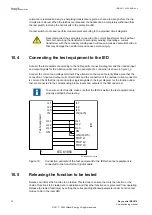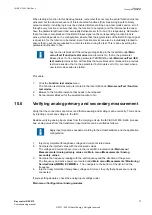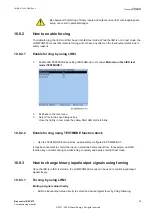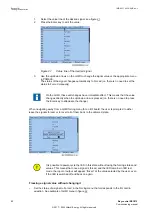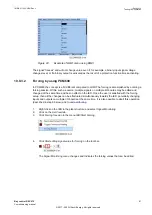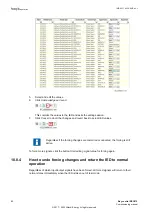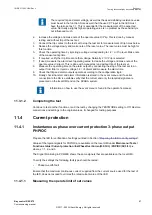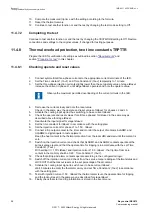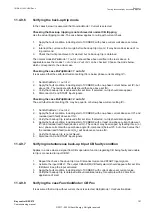
The required trip and alarm voltage, as well as the used stabilizing resistance value
must be set in the function. Note as well that the used CT input in the IED must
have the ratio set as 1:1. This is essential for the measurement of the expected
value. Normally a slightly higher operating value is no problem as the sensitivity is
not influenced much.
2.
Increase the voltage and make note of the operate value
U>Trip
. This is done by manual
testing and without trip of the test set.
3.
Connect the trip contact to the test set to stop the test set for measurement of trip times below.
4.
Reduce the voltage slowly and make note of the reset value. The reset value must be high for
this function.
5.
Check the operating time by injecting a voltage corresponding to 1.2 ˣ
U>Trip
level. Make note
of the measured trip time.
6.
If required, verify the trip time at another voltage. Normally 2 ˣ
U>Trip
is selected.
7.
If used, measure the alarm level operating value. Increase the voltage and make note of the
operate value
U>Alarm
. This is done with manual test and without trip of the test set.
8.
Measure the operating time on the alarm output by connecting the stop of the test set to an
output from
tAlarm
. Inject a voltage 1.2 ˣ
U>Alarm
and measure the alarm time.
9.
Check that trip and alarm outputs operate according to the configuration logic.
10.
Finally check that start and alarm information is stored in the event menu and if a serial
connection to the SA is available verify that the correct and only the required signals are
presented on the local HMI and on the SCADA system.
Information on how to use the event menu is found in the operator's manual.
11.3.1.2
Completing the test
SEMOD55257-73 v4
Continue to test another function or end the test by changing the
TESTMODE
setting to
Off
. Restore
connections and settings to the original values, if changed for testing purposes.
11.4
Current protection
SEMOD53531-1 v1
11.4.1
Instantaneous phase overcurrent protection 3-phase output
PHPIOC
M11754-3 v8
Prepare the IED for verification of settings outlined in Section
"Preparing the IED to verify settings"
Values of the logical signals for PHPIOC are available on the local HMI under
Main menu /Tests /
Function status /Current protection /InstPhaseOverCurrent(50,3I>>) /PHPIOC(50;3I>>):x
,
where x = 1, 2, and 3.
The Signal Monitoring in PCM600 shows the same signals that are available on the local HMI.
To verify the settings the following fault type should be tested:
•
Phase-to-earth fault
Ensure that the maximum continuous current, supplied from the current source used for the test of
the IED, does not exceed four times the rated current value of the IED.
11.4.1.1
Measuring the operate limit of set values
M11754-11 v7
1MRK 511 403-UEN Rev. L
Section 11
Testing functionality by secondary injection
Bay control REC670
87
Commissioning manual
© 2017 - 2022 Hitachi Energy. All rights reserved
Summary of Contents for REC670
Page 1: ...Relion 670 SERIES Bay control REC670 Version 2 2 IEC Commissioning manual ...
Page 2: ......
Page 28: ...22 ...
Page 54: ...48 ...
Page 60: ...54 ...
Page 66: ...60 ...
Page 90: ...84 ...
Page 212: ...206 ...
Page 218: ...212 ...
Page 232: ...226 ...
Page 240: ...234 ...
Page 241: ...235 ...




